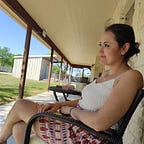It is the morning.
We turn on the news. Boom! We are trapped into a common global narrative. “The world Is a dangerous place”. The visuals are rapid and intentional. Spoonfuls of doom and gloom are down our throats.
Isn´t the media lovely? What is in the other channels?
Bang! Now we are bombarded with information about viruses that could wipe us off the face of the earth. The threat of a third world war. The extinction of thousands of species of plants. Animals and people, trapped in their domains, desperately trying to escape the escalating violence and wars that surrounds them.
That is today, tomorrow and the next day. Rinse and repeat.
What does all this noise mean?
For Ulrich Beck (1944–2015) a brilliant contemporary sociologist, risk is the anticipation of a catastrophe and the possibility of something negative that might be happening.
In other times in history, before the development of our industrial and medical technology, humans did not socially create risks. Dangers were related to the physical world.
Some threats and risks before our times were the following:
· Disease
· Lack of enough food
· Intense physical work to achieve things without present scientific knowledge and technology
In our time, things have changed dramatically, spawning new forms of risk.
Which are the current risks for us?
· Devastation of our environment and natural resources
· Toxic food and pollution
· Threat of war and terrorism
· End of the solidarity and triumph of individualism
As we can see, both in the past and present time, humanity faced risks. Ulrich Beck defined our society as The Society of Risk. How did he come to the idea that we lived in a society of risk? He came to his conclusions on the late 80`s when the tragedy of Chernobyl had just happened.
Through his analysis he realized the risks we face nowadays are unique. What makes our society different -according to Beck- is that we create risks as an unwanted consequence of the way we live, and the structure of our social world, and he called this the Second Modernity.
We have put ourselves into risks that we created and continue to generate. If we think about it, we produce ecologic damage, put toxic substances into our food and initiate wars.
This appears to be self-destructive, but it’s crucial to remember we are not creating these consequences individually and the risks are needed for our society and economy to operate.
Military industry, health and pharmaceutical corporations, insurance companies, and lately green ecologic industries are built around risk and one human emotion: FEAR.
Concern about things that might or might not happen in the future but that govern our world as if they were facts.
As governments and the news portrait a world endangered by those risks, we fail to see other hazards and are unable to recognize what is generating them.
For example, disease, disability, ageing, unemployment, or being unable to pay a mortgage, but also global warming, are portraited as issues of personal responsibility (individual risks), rather than social problems to be addressed through collective organization.
Although many believe otherwise, truth is, lack of sufficient social welfare and pensions, poverty and loneliness, are social problems that we cannot address individually.
Proactivity, saving money, getting a good insurance, consuming organic food, working hard, writing a blog, or just having good luck won´t significantly protect you from future perils.
What really changes your prospective and gives you advantage in every possible aspect of your life are social determinants related to bigger social aspects.
Your nationality, the color of your skin, your sex/gender orientation, your level of education and the economical position of your family of origin are determinants for your future wellbeing. This has been studied and demonstrated by research, such as the one conducted by Kenneth Ferraro or Dale Dannefer, who demonstrated the importance of cumulative inequality in the life course.
We can´t face risks independently when they are created socially
Risks we fight today are created socially inside a powerful social structure, integrated by people that have the power to influence the destiny of humanity.
That is why bringing your own cloth bags into the supermarket, buying organic, becoming a vegan or working extra hours will not significantly improve your chances to live in a cleaner world, have a healthier life or enjoy a better quality of life.
Jumping into those trends both reflect and reinforce the same structure.
To say it clearly and in terms of Ulrich Beck:
In our modern society individualism and erosion of solidarities are the norm.
We feel responsible in our individuality for our small decisions. We come to the point where we question every food product we consume and divide our garbage into six different containers.
Yet we lack to see what is in front of us. The truth is in the subtext. It is in the dangers being created by a bigger structure incarnated by powerful corporations and governments who skillfully sustain a social fabric that produces the toxicity and risks that surrounds each of us.
References
Beck, U. (1992). The Risk Society: towards a new modernity, London: Sage Publishing.
